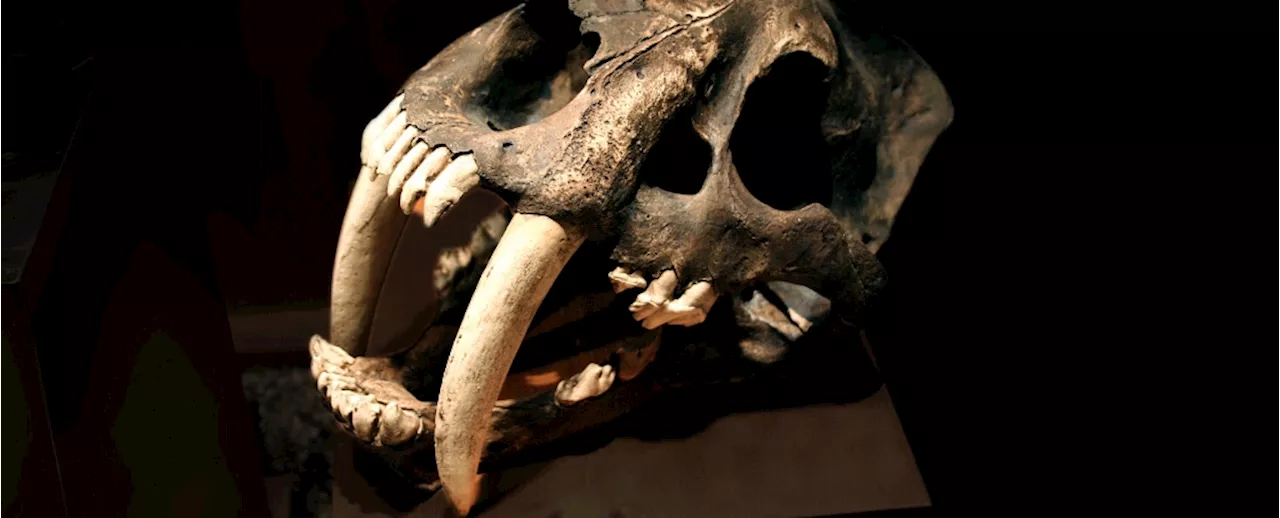The Best in Science News and Amazing Breakthroughs
throughout mammalian history and are a classic example of convergence, which is when similar structures evolve independently in unrelated animal groups., provides an answer. We found extreme saber teeth are functionally optimal, meaning their shape provided a real advantage as specialised weapons.
The feature that defines them are their sabers, a distinct type of canine tooth. These teeth are long, sharp, laterally compressed and curved.Many extinct predators around the world evolved saber teeth which are very different to the teeth of modern big cats. – below. This model has been digitised from a cast specimen from the Natural History Museum of Los Angeles County.
To investigate this, we conducted a large-scale analysis of more than 200 different carnivore teeth, including both extinct saber-toothed species and modern animals. We also ran engineering simulations to test how much stress different tooth shapes experienced under biting forces. This revealed their likelihood of breaking.
The fact that different saber-toothed species evolved varying balances between puncture efficiency and strength suggests a broader range of hunting strategies than previously thought. This supports a growing body of research on their ecological diversity.These results help explain why extreme saber teeth evolved so many times, likely driven by natural selection for an optimal design. They also provide a possible explanation for their eventual demise.
The saber tooth form represents a striking solution to a fundamental mechanical challenge, balancing efficiency with strength — one that is also reflected in human-made tools.
United States Latest News, United States Headlines
Similar News:You can also read news stories similar to this one that we have collected from other news sources.
 Chemical Abortion Pain Intensity Surprises Many WomenA new study reveals that many women undergoing chemical abortions experience more pain than anticipated.
Chemical Abortion Pain Intensity Surprises Many WomenA new study reveals that many women undergoing chemical abortions experience more pain than anticipated.
Read more »
 Ed Sheeran claims Benny Blanco forced him to travel to UK by boat for 10 days because producer is 'scared of flying'Ed Sheeran reveals hilarious reason why he gave away hit song 'Love Yourself' to Justin Bieber
Ed Sheeran claims Benny Blanco forced him to travel to UK by boat for 10 days because producer is 'scared of flying'Ed Sheeran reveals hilarious reason why he gave away hit song 'Love Yourself' to Justin Bieber
Read more »
 Khloé Kardashian reveals why she skipped this year's family Christmas Eve party: 'I feel so terrible'Khloé Kardashian reveals why she skipped this year’s family Christmas party
Khloé Kardashian reveals why she skipped this year's family Christmas Eve party: 'I feel so terrible'Khloé Kardashian reveals why she skipped this year’s family Christmas party
Read more »
 Elite five-star Michigan commit Andrew Babalola reveals why he chose MichiganElite Michigan offensive lineman Andrew Babalola reveals why he comitted to Michigan
Elite five-star Michigan commit Andrew Babalola reveals why he chose MichiganElite Michigan offensive lineman Andrew Babalola reveals why he comitted to Michigan
Read more »
 Fetal defense: Study reveals early immune protection in the wombResearch revealed that foetuses are not as defenceless as once thought; they can actually fight infections from within the womb.
Fetal defense: Study reveals early immune protection in the wombResearch revealed that foetuses are not as defenceless as once thought; they can actually fight infections from within the womb.
Read more »
 Study reveals short term safety of active monitoring for ductal carcinoma in situThe first study comparing surgery to active monitoring as treatment for ductal carcinoma in situ (DCIS) finds women who carefully monitor the precancerous cells are no more likely to develop breast cancer after two years than women who undergo surgery to remove them.
Study reveals short term safety of active monitoring for ductal carcinoma in situThe first study comparing surgery to active monitoring as treatment for ductal carcinoma in situ (DCIS) finds women who carefully monitor the precancerous cells are no more likely to develop breast cancer after two years than women who undergo surgery to remove them.
Read more »
